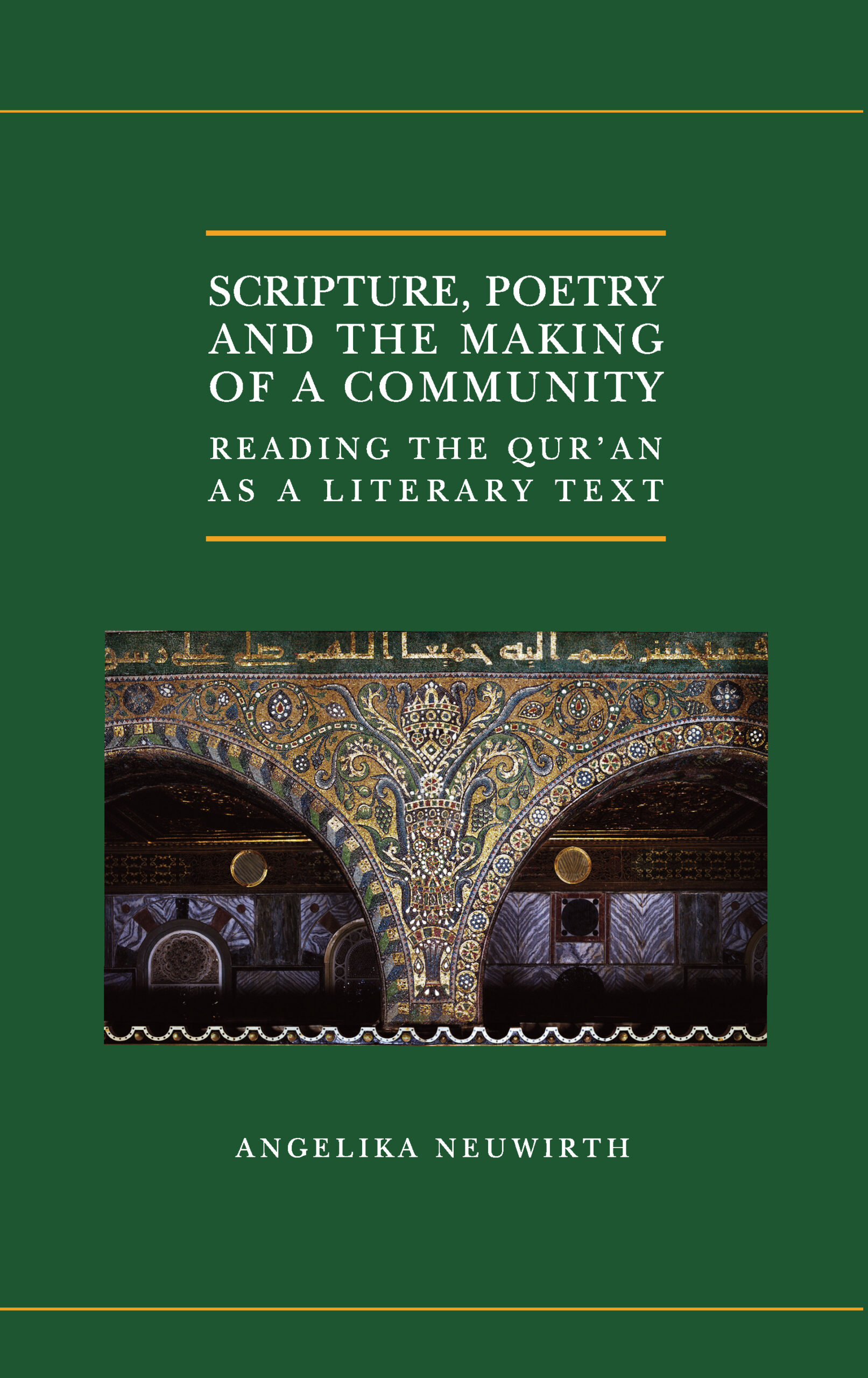This volume presents the views on the Qur’anMuslims believe that the Holy Qur’an contains divine revelations to the Prophet Muhammed received in Mecca and Medina over a period of 23 years in the early 7th century CE. More by Professor Angelika Neuwirth, one of the leading scholars in Qur’anic studies today. It contains fourteen articles that reflect her original thought on the topic as developed over thirty years of research. The book consists of a mixture of new as well as previously published pieces, some of which are translations from the German while others are articles originally written in English. Thus, for the first time, Prof. Neuwirth’s scholarship on the Qur’an is presented to a global audience in English in a comprehensive way.
In Prof. Neuwirth’s view, scholars are used to understanding the Qur’an as the ‘Islamic text’ par excellence, an assumption which, when viewed historically, is far from evident. More than twenty years before it rose to the rank of Islamic scripture, the Qur’an was an oral proclamation addressed by the Prophet Muhammad to pre-Islamic listeners, for the Muslim community had not yet been formed. Those listeners might best be described as individuals educated in late antique culture, be they Arab pagans familiar with the monotheistic religions of Judaism and Christianity, or syncretists of these religions, or learned Jews and Christians whose presence is reflected in the Medinan suras. The interactive communication process between Muhammad and these groups brought about an epistemic turn in Arab Late Antiquity: with the Qur’anic discovery of writing as the ultimate authority, the nascent community attained a new ‘textual coherence’ where scripture, with its valorisation of history and memory, was recognised as a guiding concept. It is within this new Biblically imprinted world view that central principles and values of the pagan Arab milieu were debated. This process resulted in a twin achievement: the genesis of a new scripture and the emergence of a community.
Two great traditions, then, the Biblical, transmitted by both Jews and Christians, and the local Arabic, represented in Ancient Arabic poetry, appear to have established the field of tension from which the Qur’an evolved; it was both scripture and poetry which had produced and shaped the emerging Muslim community.
Introduction
I. Pagan and Monotheistic Frameworks
1. Neither of the East nor of the West (lā sharqiyya wa lā gharbiyya, Q. 24:35): Locating the Qur’an within the History of Scholarship
2. From Tribal Genealogy to Divine Covenant: Qur’anic Refigurations of Pagan Arab Ideals Based on Biblical Models
3. Glimpses of Paradise in the World and Lost Aspects of the World in the Hereafter: Two Qur’anic Re-readings of Biblical Psalms
4. Images and Metaphors in the Introductory Sections of the Early Meccan Suras
II: The Liturgical Qur’an and the Emergence of the Community
5. From Recitation through Liturgy to Canon: Sura Composition and Dissolution during the Development of Islamic Ritual
6. Sūrat al-Fātiḥa (Q. 1): Opening of the Textual Corpus of the Qur’an or Introit of the Prayer Service?
7. Referentiality and Textuality in Sūrat al-Ḥijr (Q. 15): Observations on the Qur’anic ‘Canonical Process’ and the Emergence of a Community
8. From the Sacred Mosque to the Remote Temple: Sūrat al-Isrāʾ (Q. 17), between Text and Commentary
9. A Discovery of Evil in the Qur’an? Revisiting Qur’anic Versions of the Decalogue in the Context of Pagan Arab Late Antiquity
III. Narrative Figures between the Bible and the Qur’an
10. Narrative as Canonical Process: The Story of Moses Seen through the Evolving History of the Qur’an
11. Oral Scriptures in Contact: The Qur’anic Story of the Golden Calf and its Position between Narrative, Cult and Inter-communal Debate
12. Imagining Mary, Disputing Jesus: Reading Sūrat Maryam (Q. 19) and Related Meccan Texts in the Context of the Qur’anic Communication Process
13. Mary and Jesus: Counterbalancing the Biblical Patriarchs. A Re-reading of Sūrat Maryam (Q. 19) in Sūrat al-Imrān (Q. 3)
14. Myths and Legends in the Qur’an? An Itinerary through its Narrative Landscape
Bibliography
Index of Qur’anic Citations
Index of Biblical and Post-Biblical Citations
Index
‘Neuwirth’s discussions of the canonization of the Qur’an and her analyses of specific suras are very significant, and the arguments and interpretations in the articles are intellectually impressive. A volume such as this will be of tremendous use not only to scholars of the Qur’an but to scholars in Biblical studies and religious studies generally.’
– Shawkat M. Toorawa, Associate Professor of Arabic Literature and Islamic Studies, Cornell University
‘As everyone who follows the scholarly study of the Qur’an in our times knows, Neuwirth’s work has been trendsetting. The publication of her very original studies in English is long overdue as the delay has prevented one of the most important voices in Qur’an scholarship today from being clearly heard in the English-speaking academic communities.’
– Sidney H. Griffith, Professor in the Department of Semitic and Egyptian Languages and Literatures, Catholic University of America
‘Neuwirth’s rigorous close readings will enormously benefit not only scholars and teachers of the Qur’an and Arabic literature but also those committed to globalising the study of sacred texts as literary texts.’
– Mark LeTourneau, Journal of Religious History, Religious History Association
Angelika Neuwirth was educated in Classics and Oriental Studies at German and international universities (Italy, Iran and Israel). She has taught at the Universities of Munich, Amman, Bamberg, and Cairo, and has held the Chair of Arabic Studies at the Freie Universität Berlin since 1991. From 1994 to 1999 she served as the director of the Orient-Institut der Deutschen Morgenländischen Gesellschaft in Beirut and Istanbul.
Her major fields of research are classical and modern Arabic literature and Arab Late Antiquity studies. In several recent publications, Professor Neuwirth has tried to vindicate the Qur’an as a Late Antique text, which – though deeply rooted in Arab culture – has contributed creatively to a number of major theological discourses. Professor Neuwirth has been acknowledged for her novel approach to interreligious studies by being bestowed several honorary doctorates, academy memberships and professional awards.

